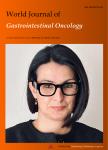Multitarget stool DNA for colorectal cancer screening:A review and commentary on the United States Preventive Services Draft Guidelines
Multitarget stool DNA for colorectal cancer screening:A review and commentary on the United States Preventive Services Draft Guidelines作者机构:Medical AffairsExact Sciences Corporation Scientific Advisory BoardExact Sciences Departments of Medicine and Community Health SciencesUniversity of Calgary
出 版 物:《World Journal of Gastrointestinal Oncology》 (世界胃肠肿瘤学杂志(英文版)(电子版))
年 卷 期:2016年第8卷第5期
页 面:450-458页
核心收录:
学科分类:1002[医学-临床医学] 100214[医学-肿瘤学] 10[医学]
主 题:Colorectal cancer screening Multitarget stool DNA Stool DNA The United States Preventive Services Task Force Cancer Intervention Surveillance Modeling Network Fecal immunological technique Modeling Interval
摘 要:Multitarget stool DNA(mt-sDNA) testing was approved for average risk colorectal cancer(CRC) screening by the United States Food and Drug Administration and thereafter reimbursed for use by the Medicare program(2014).The United States Preventive Services Task Force(USPSTF) October 2015 draft recommendation for CRC screening included mt-s DNA as an alternative screening test that may be useful in select clinical circumstances,despite its very high sensitivity for early stage CRC.The evidence supporting mt-s DNA for routine screening use is robust.The clinical efficacy of mt-s DNA as measured by sensitivity,specificity,life-years gained(LYG),and CRC deaths averted is similar to or exceeds that of the other more specifically recommended screening options included in the draft document,especially those requiring annual testing adherence.In a population with primarily irregular screening participation,tests with the highest point sensitivity and reasonable specificity are more likely to favorably impact CRC related morbidity and mortality than those depending on annual adherence.This paper reviews the evidence supporting mt-s DNA for routine screening and demonstrates,using USPSTF s modeling data,that mt-s DNA at three-year intervals provides significant clinical net benefits and fewer complications per LYG than annual fecal immunochemical testing,high sensitivity guaiac based fecal occult blood testing and 10-year colonoscopy screening.



